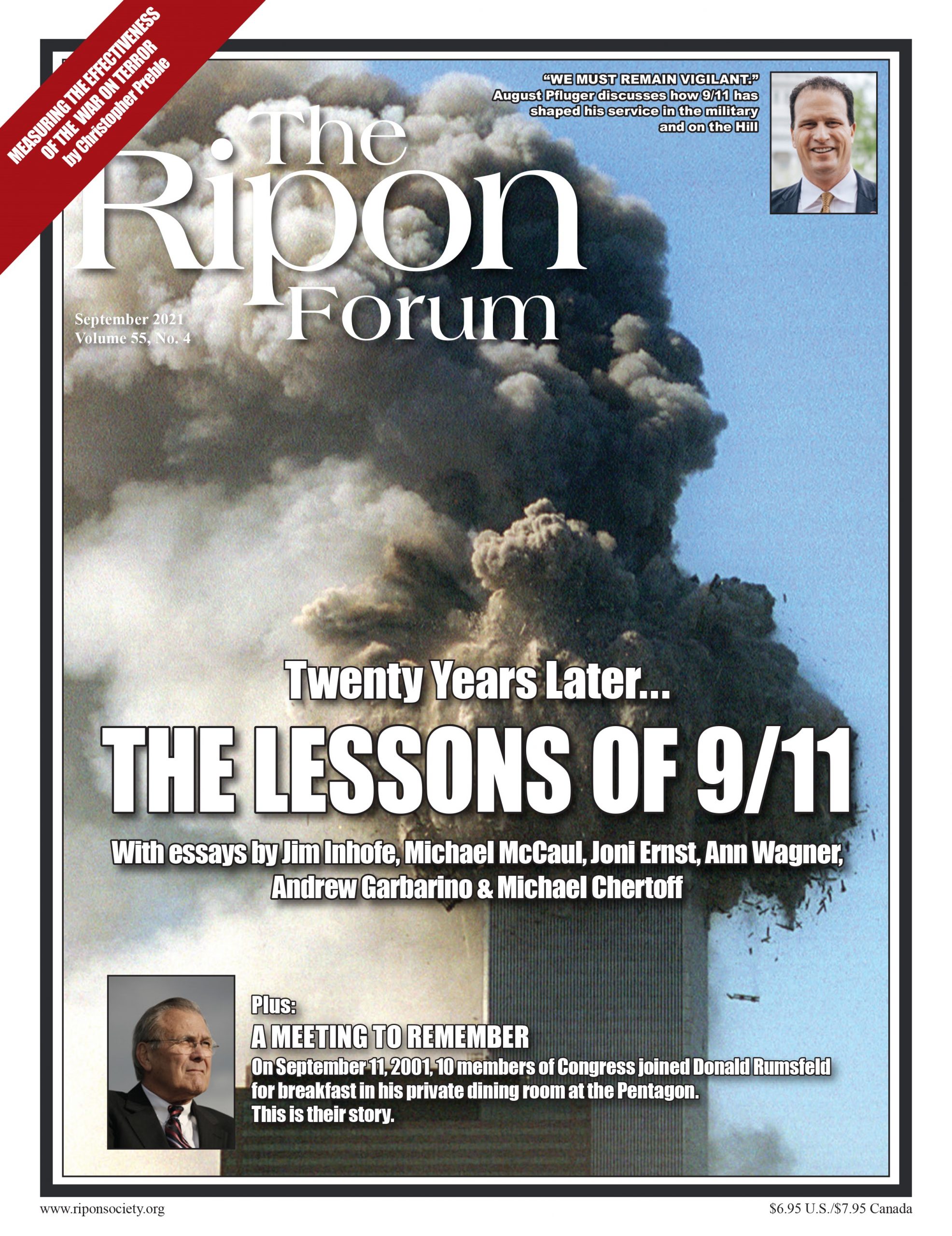With essays by Jim Inhofe, Michael McCaul, Joni Ernst, Ann Wagner, Andrew Garbarino & Michael Chertoff
WASHINGTON, DC — With the Taliban once again in control of Afghanistan and America marking the 20th anniversary of the September 11, 2001 terrorist attacks this week, The Ripon Forum examines “The Lessons of 9/11” and what has been learned — and not learned — from that tragic and fateful day. Those writing for this latest edition include:
U.S. Sen. Jim Inhofe, the Ranking Member of the Senate Armed Services Committee, who writes: “President Biden’s decision allows, and even accelerates, Afghanistan returning to the conditions that permitted the 9/11 terrorist attack to happen in the first place. Because of him, Afghanistan will, once again, become a petri dish for international terrorists.”
U.S. Rep. Michael McCaul, the Ranking Member of the House Foreign Affairs Committee, who writes: “Twenty years after the horrific attacks of September 11th, we are once again facing an Afghanistan that will serve as a safe haven for terrorists. I predict we will soon face the threat of attacks emanating from the country targeting American soil and our allies.”
U.S. Sen. Joni Ernst, the Ranking Member on the Armed Services Subcommittee on Emerging Threats and Capabilities, who writes: “With our adversaries emboldened, the Taliban reinvigorated, and the threat of violent extremist organizations looming large, we must remain clear-eyed about the persistent threats jeopardizing our national security. American lives are hanging in the balance. We simply cannot afford to let our guard down.”
U.S. Rep. Ann Wagner, the Vice Ranking Member of the Foreign Affairs Committee, who writes: “I fear the current Administration has forgotten the most important lesson of 9/11: the necessity of sending the clear and unequivocal message to our adversaries that attacks on the United States, its people, and its allies will be met with forceful consequences. Instead, President Biden communicated that saving the lives of American citizens and the brave Afghans who fought alongside us mattered less than meeting a deadline set by the Taliban.”
U.S. Rep. Andrew Garbarino, the Ranking Member of the Homeland Security Subcommittee on Cybersecurity, Infrastructure Protection, and Innovation, who writes: “In the 20 years since the 9/11 attack, our intelligence and homeland security community has made great strides to improve our security posture, but in many ways America is under greater threat than ever. The situation in Afghanistan has made this painfully clear.”
Michael Chertoff, the Secretary of the U.S. Department of Homeland Security from 2005 to 2009, who — with an eye on the threats that Americans now face at home — writes: “The 9/11 Commission report allowed for a bipartisan examination of the failures that contributed to the execution of the most devastating act of terrorism our country has ever seen … I call on our elected officials to support the January 6th Commission with the same unity and sense of purpose that was present in the aftermath of 9/11.”
In addition to these six essays, the latest edition of the centrist Republican journal also features “A Meeting to Remember”, a never-before-told story of 10 lawmakers who joined then-Defense Secretary Donald Rumsfeld for breakfast in his private dining room at the Pentagon the morning of 9/11 and returned to Capitol Hill shortly before the building was attacked.
“Rummy was always completely in command,” then-Congressman Mark Kirk recalled. “To be there having breakfast in the Secretary’s private dining room was quite an honor.”
“He had no doubt that, perhaps sooner than later, we would be faced with a significant event,” then-Congressman Chris Cox said of Rumsfeld and the prescient point he made during the meeting. “And while the nature of the attack might be a surprise, he said the fact that it will happen should not be.”
“What I remember,” said then-Congressman Mac Thornberry of the moment near the end of the meeting when an aide delivered Rumsfeld some startling news, “is somebody bringing him a note, and then he said to the group something about a plane hitting a building in New York.”
Recalling the group’s own close call that morning, then-Congressman and current Senator Roger Wicker observed: “The hijackers allowed the plane that took off from Dulles to go much further … If they had gained control of the plane sooner, they would have crashed into the Pentagon while we were there.”
Other pieces in this edition of the Forum include:
– Christopher Preble of the Atlantic Council examining the effort to confront terrorism over the past two decades and whether America is winning or losing the war;
– Former senior FBI counterterrorism analyst and current University of Michigan Professor Javed Ali looking at the rise of homegrown terror in the United States and the threat it poses today; and,
– Andy Weber and Nicole Teran of the Council on Strategic Risks assessing the threat of bio-terror in this age of COVID-19 and what the U.S. needs to do to keep the American people secure.
And in the latest Ripon Profile, first term Congressman August Pfluger of Texas discusses his service in the military, his new career on Capitol Hill, and how the attacks of September 11, 2001 affected both.
The Ripon Forum is published six times a year by The Ripon Society, a public policy organization that was founded in 1962 and takes its name from the town where the Republican Party was born in 1854 – Ripon, Wisconsin. One of the main goals of The Ripon Society is to promote the ideas and principles that have made America great and contributed to the GOP’s success. These ideas include keeping our nation secure, keeping taxes low and having a federal government that is smaller, smarter and more accountable to the people.




